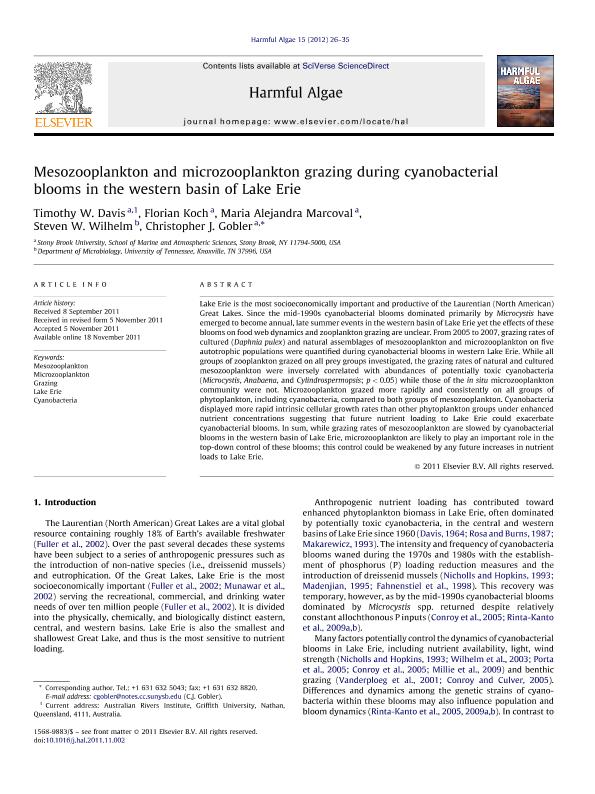Artículo
Mesozooplankton and microzooplankton grazing during cyanobacterial blooms in the western basin of Lake Erie
Davis, Timothy W.; Koch, Florian; Marcoval, Maria Alejandra ; Wilhelm, Steven W.; Gobler, Christopher J.
; Wilhelm, Steven W.; Gobler, Christopher J.
 ; Wilhelm, Steven W.; Gobler, Christopher J.
; Wilhelm, Steven W.; Gobler, Christopher J.
Fecha de publicación:
03/2012
Editorial:
Elsevier Science
Revista:
Harmful Algae
ISSN:
1568-9883
Idioma:
Inglés
Tipo de recurso:
Artículo publicado
Clasificación temática:
Resumen
Lake Erie is the most socioeconomically important and productive of the Laurentian (North American) Great Lakes. Since the mid-1990s cyanobacterial blooms dominated primarily by Microcystis have emerged to become annual, late summer events in the western basin of Lake Erie yet the effects of these blooms on food web dynamics and zooplankton grazing are unclear. From 2005 to 2007, grazing rates of cultured (Daphnia pulex) and natural assemblages of mesozooplankton and microzooplankton on five autotrophic populations were quantified during cyanobacterial blooms in western Lake Erie. While all groups of zooplankton grazed on all prey groups investigated, the grazing rates of natural and cultured mesozooplankton were inversely correlated with abundances of potentially toxic cyanobacteria (Microcystis, Anabaena, and Cylindrospermopsis; p < 0.05) while those of the in situ microzooplankton community were not. Microzooplankton grazed more rapidly and consistently on all groups of phytoplankton, including cyanobacteria, compared to both groups of mesozooplankton. Cyanobacteria displayed more rapid intrinsic cellular growth rates than other phytoplankton groups under enhanced nutrient concentrations suggesting that future nutrient loading to Lake Erie could exacerbate cyanobacterial blooms. In sum, while grazing rates of mesozooplankton are slowed by cyanobacterial blooms in the western basin of Lake Erie, microzooplankton are likely to play an important role in the top-down control of these blooms; this control could be weakened by any future increases in nutrient loads to Lake Erie
Palabras clave:
CYANOBACTERIA
,
GRAZING
,
LAKE ERIE
,
MESOZOOPLANKTON
,
MICROZOOPLANKTON
Archivos asociados
Licencia
Identificadores
Colecciones
Articulos(CCT - MAR DEL PLATA)
Articulos de CTRO.CIENTIFICO TECNOL.CONICET - MAR DEL PLATA
Articulos de CTRO.CIENTIFICO TECNOL.CONICET - MAR DEL PLATA
Citación
Davis, Timothy W.; Koch, Florian; Marcoval, Maria Alejandra; Wilhelm, Steven W.; Gobler, Christopher J.; Mesozooplankton and microzooplankton grazing during cyanobacterial blooms in the western basin of Lake Erie; Elsevier Science; Harmful Algae; 15; 3-2012; 26-35
Compartir
Altmétricas



